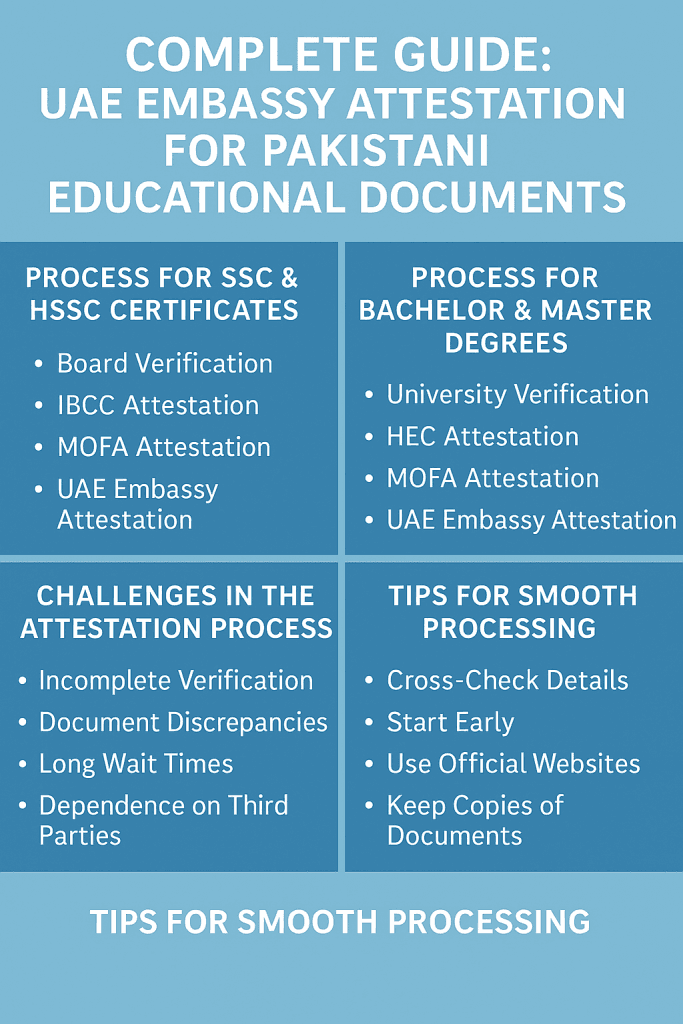Introduction
If you’re a Pakistani student or professional planning to study or work in the United Arab Emirates (UAE), getting your educational documents attested is a mandatory requirement. The attestation process ensures that your qualifications are recognized and accepted by UAE authorities. This guide provides a detailed, explanation of the UAE Embassy attestation process for SSC, HSSC, Bachelor’s, and Master’s degrees issued in Pakistan.
Why Is UAE Embassy Attestation Necessary?
Attestation verifies the authenticity of your educational documents, allowing them to be legally accepted in the UAE for employment, higher education, or visa purposes. Without proper attestation, your application may be rejected by UAE institutions or employers.
Attestation Process for Pakistani Educational Certificates

1. Attestation for SSC & HSSC Certificates
These documents are issued by Pakistani educational boards and must be attested through a multi-step process.
Step-by-Step Process:
Board Verification:
Visit your respective educational board to get the SSC and HSSC certificates verified.IBCC Attestation:
Submit verified certificates to the Inter Board Committee of Chairmen (IBCC).
You can apply online via IBCC website.
Required Documents:
Original and copy of SSC/HSSC certificate
CNIC or B-Form copy
MOFA Attestation:
Once attested by IBCC, submit the documents to the Ministry of Foreign Affairs (MOFA).
MOFA attestation centers are located in Islamabad, Lahore, Karachi, Peshawar, and Quetta.
UAE Embassy Attestation:
After MOFA, submit your documents to the UAE Embassy in Pakistan
CNIC and passport copy required.
Processing is usually done via authorized agents or attestation service providers.
Estimated Processing Time: 2–3 working days
2. Attestation for Bachelor & Master Degrees
Degrees awarded by universities in Pakistan require attestation through a different set of authorities.
Step-by-Step Process:
University Verification:
Contact the issuing university to verify your degree and transcripts.(not for all universities)
Some universities now offer online verification portals. (not for all universities)
HEC Attestation:
Apply online via the Higher Education Commission (HEC) portal at eportal.hec.gov.pk.
Required Documents:
Original and photocopy of degree & transcript
CNIC & passport copy
University verification proof (if needed)
MOFA Attestation:
Submit the HEC-attested documents to MOFA for further authentication.
UAE Embassy Attestation:
Finally, take the MOFA-attested documents to the UAE Embassy or Consulate for official attestation.
Estimated Processing Time: 02–5 working days
Challenges in the Attestation Process
Incomplete Verification: Delays can occur if your educational board or university has not digitized or verified records.
Document Discrepancies: Name or date mismatches between documents and passport can lead to rejection.
Long Wait Times: High application volume, especially during academic seasons, can slow down processing.
Dependence on Third Parties: The UAE Embassy requires documents to be submitted through authorized agents, which adds cost and complexity.
Tips for Smooth Processing
Always cross-check spellings and document details before submission.
Start the process early to avoid delays in job or visa applications.
Use official websites to apply and track the status of your attestation.
Keep multiple photocopies and digital scans of all documents.
Conclusion
Getting your educational documents attested for the UAE Embassy might seem complex, but following the correct sequence—board/university verification, IBCC/HEC attestation, MOFA, and finally UAE Embassy—makes the process manageable. Early preparation, attention to detail, and working with reputable service providers can save time and avoid unnecessary delays.
